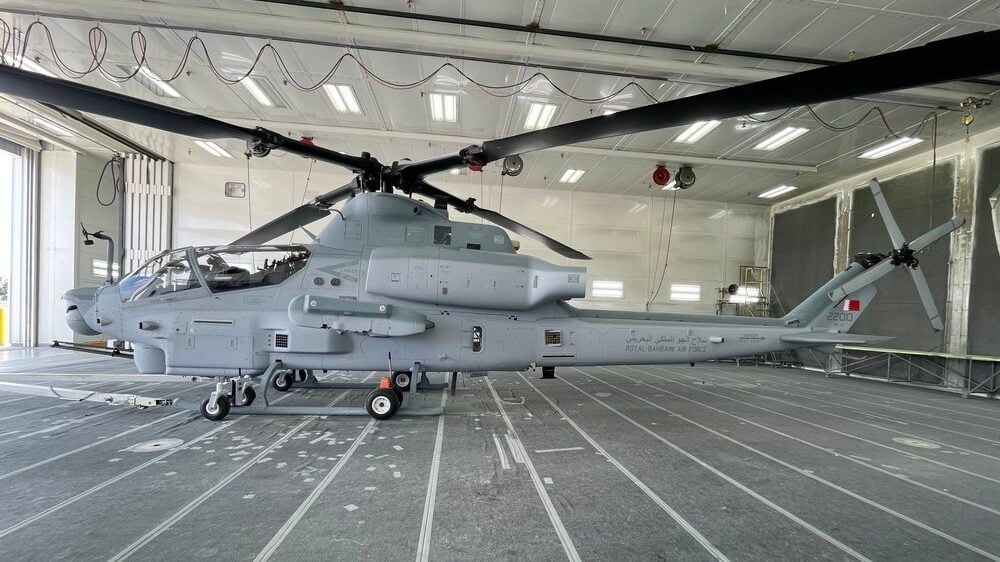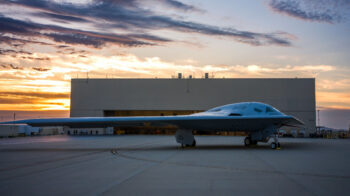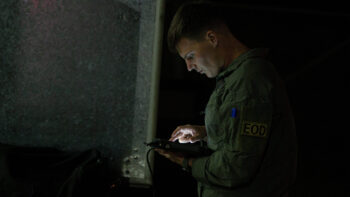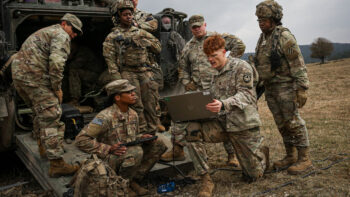
The first of 12 AH-1Z Viper attack helo for the Royal Bahraini Air Force at the roll-out ceremony Oct.22 (Bell Textron)
BEIRUT: When Bahrain officially receives the first of 12 AH-1Z Viper attack helicopters in 2022, it will represent more than just a technical upgrade to an aging fleet, according to analysts. As is so often the case with foreign military sales cases, the procurement is a signal from Manama to partners in the region and abroad that it is willing to take on a greater role in military operations.
The country got one step closer on Oct. 22, when Bell Textron delivered the first aircraft to US Naval Air Systems Command as part of the 2019 foreign military sales (FMS) contract valued for $911.4 million. Under FMS deals, the US government acts as an intermediary between industry and the final customer; in this case, it is expected that all 12 of the Vipers will be handed over to NAVAIR before the end of 2022, Scott Clifton, Bell’s international H-1 program manager, told Breaking Defense
Bell and the US Government will have small teams in Bahrain when the aircraft arrives to complete post-shipping inspections and ensure weapons integration meets the Bahrain configuration. And integration will be important, as the capability represents a notable technical step up from what Bahrain has been operating to this point.
“The Vipers elevate the overall quality of the Bahraini integrated air defense system, which has relied on older platforms like the AH-1F and F-16C/D that are often a few upgrades behind — and sometimes even a generation behind — those of their regional allies,” Brandon C. Patrick, a Mid-East defense analyst told Breaking Defense.
RELATED: ‘Mission Impossible?’ Interoperability Across Arab States
The Viper is designed and tested for ballistic tolerance, includes built-in redundancy in all of its critical parts, and has a fully integrated threat detection and counter-measure system. It is also marinized for a saltwater environment from the point of manufacture that can bring the advanced multi-mission capabilities of a modern attack platform to the region. And the Bahraini attack mission will benefit from improved avionics, a newer helmet-mounted HUD system and advanced information sharing capabilities, among other advances.
“The fact that the airframes, internal components, and fittings are coated with corrosion-resistant paint sealing to reduce the effects of saltwater on the metal, provides the aircraft with greater protection from sand, as it limits the ability for sand to work its way into the fitting,” Clifton noted.
Fadi Assaf, co-founder of Beirut-based consultancy Middle East Strategic Perspectives (MESP), noted that the deal enhances Bahrain’s capability “to protect strategic sites and defend offshore installations while hydrocarbon discoveries are reshaping the energy prospects of the country.”
Assaf highlighted the benefit of greater integration “within the [Gulf Cooperation Council] shield forces and the Saudi-led Coalition, and enhance coordination with US forces based in Bahrain and other NATO members. … This is a military and operational matter, but above all it remains a strategic issue for Bahrain’s leadership and its neighbor and big brother Saudi Arabia.”
Strategically however, the upgrade may mean more domestically than it does abroad. “While nearby Iran always looms large as a threat to regional balance, there are few scenarios in which Bahraini attack helicopters would be pitted against Iranian targets,” Patrick said.
Of greater concern to Bahrain’s Sunni royal family is “the majority-Shiite population over whom they rule and the potential for Iran-inspired protests, insurrection, or revolutionary efforts such as those of the Arab Spring ten years ago,” Patrick said.
So while it’s comforting to imagine that US hardware will only be directed at terrorists and Iranian threats, “Bahrain’s history of suppressing internal dissent with external weaponry suggests that these choppers may end up serving a police function during times of crisis, as well,” he added.
What the deal represents
Even before the withdrawal of US troops and military hardware from the region, Bahrain was looking to upgrade its military capabilities. Why? Mainly because of fears among leadership that regional players will interfere with internal affairs and provoke unrest, Assaf said.
“There is the need to enhance its deterrence capacity against its Iranian and even Qatari neighbors — Doha being the home for a Turkish military base,” he said. “Add to that the American reassurance to the Bahraini leadership on its commitment towards the security of the Kingdom.”
From a US perspective, Bahrain is gaining strategic value. The Kingdom, which is a major non-NATO ally to the US since 2002, is also home to the Fifth Fleet and to the US Naval Forces Central Command.
“More recently, in 2018, UK inaugurated a Naval Support Facility in Bahrain, while the US is boosting BDF’s operational and logistic capabilities with the purpose to enhance interoperability with its own forces and those of its allies,” Assaf said.
RELATED: Navy’s Unmanned Ships Sail With US Ally In The Middle East
Arms deals between the US and Bahrain or its neighbors in the Gulf are not new. Bahrain has secured deals for US attack helicopters, TOW missiles, fast attack boats, various armaments, and more in the last decade alone.
“However the political winds in Washington change, the preference for stable kingdoms (some call them autocracies) over unpredictable democracies has been a common and central aspect of US policy toward the region in the post-World War II era,” Patrick said.
Rightly or wrongly, “the Biden administration seems to have accepted the argument that the Gulf monarchies are the first line of defense against regional extremism, and that ensuring their ability to combat terrorism is in the US interest — even if it comes at a cost to democratic aspirations around the Arab World,” he added.
So whether or not the Biden administration is interested in playing a less prominent role in the region or stepping down US involvement there, “it is clear that the administration accepts the need for strong and ongoing partnerships with the Gulf States,” Patrick explained.
Today, Bahrain is more than just any military partner to the US. “The Abraham Accords, the containment of Iran, the war on terrorism, protecting the navigation in the Gulf, monitoring the presence of rivals, like China, are among several factors that clearly demonstrate the growing importance of the Kingdom to the US regional policy,” Assaf concluded.
China’s new H-20 stealth bomber ‘not really’ a concern for Pentagon, says intel official
“The thing with the H-20 is when you actually look at the system design, it’s probably nowhere near as good as US LO [low observable] platforms, particularly more advanced ones that we have coming down,” said a DoD intelligence official.



























